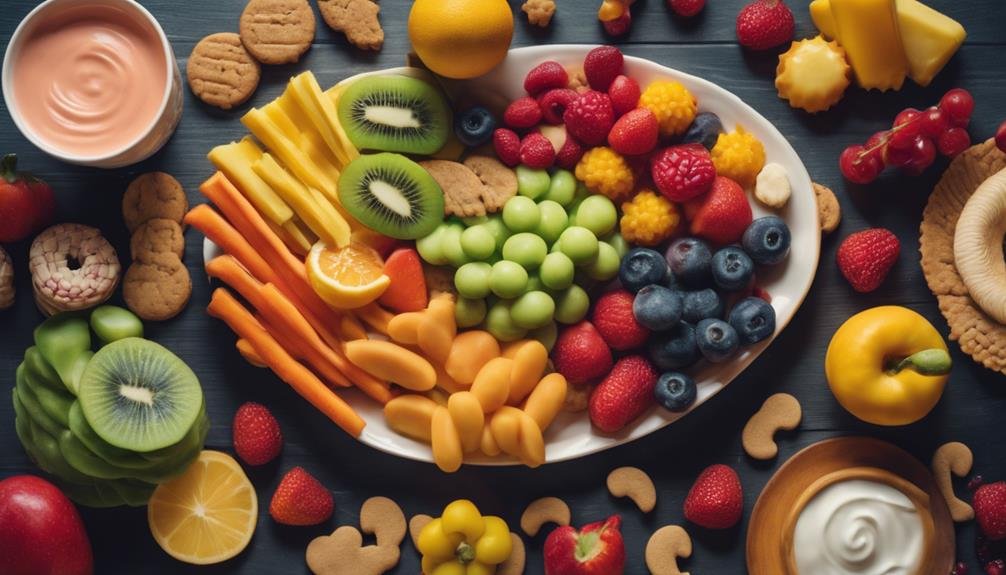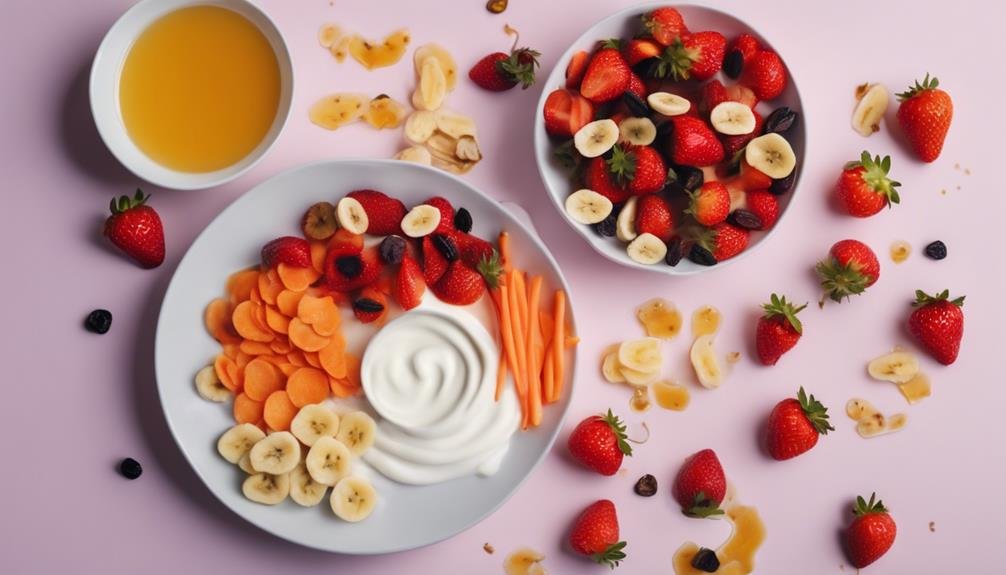"Cherishing Little Steps - A Haven for Baby and Family Journeys"
Sugar Intake for Toddlers: How to Keep It in Check
You may be surprised to learn that the average toddler in the United States consumes about 7 teaspoons of added sugar per day. With sugar hiding in many foods marketed towards children, it's vital to be mindful of your little one's sugar intake. But how can you navigate this sweet challenge and ensure your toddler's diet stays balanced and healthy? Let's explore some practical tips and strategies that can help you keep your child's sugar intake in check without sacrificing taste or enjoyment.
Key Takeaways
- Monitor sugar intake by reading labels and limiting sugary treats.
- Offer healthier alternatives like fruits, nuts, and seeds.
- Encourage water as the main beverage choice for toddlers.
- Model healthy eating habits to influence toddler's choices.
- Set clear boundaries for sweet consumption to promote good eating habits.
Importance of Limiting Sugar Intake

To ensure optimal health and well-being for your toddler, it's crucial to limit their sugar intake. Excessive sugar consumption in toddlers has been linked to various health issues, including obesity, dental problems, and even behavioral issues. By controlling the amount of sugar your child consumes, you can help set them on a path to a healthier future.
When it comes to sugar, moderation is key. Aim to provide your toddler with nutritious meals and snacks that are low in added sugars. Instead of sugary treats, opt for fruits, vegetables, whole grains, and lean proteins. These foods not only provide essential nutrients but also help prevent sugar spikes and crashes, keeping your child energized throughout the day.
Understanding Hidden Sugars
Understanding hidden sugars is essential for parents to make informed choices about their toddler's diet. While you may already be cautious about sugary snacks and desserts, hidden sugars lurk in many unexpected places. Processed foods like cereals, yogurts, and even seemingly healthy fruit juices can contain high amounts of added sugars. Reading labels is crucial; ingredients like corn syrup, dextrose, or sucrose indicate added sugars. Remember, even savory items like pasta sauce or bread can harbor hidden sugars.
To protect your toddler's health, focus on whole foods and limit processed snacks. Opt for fresh fruits instead of fruit snacks or flavored yogurt. When choosing packaged foods, select options with little to no added sugars. Encouraging water as the main beverage and avoiding sugary drinks is also key. By understanding hidden sugars and making mindful choices, you can help your toddler develop a healthy relationship with food while reducing their sugar intake without sacrificing taste.
Healthy Alternatives to Sugary Treats

Hidden sugars can often be replaced with healthier options, providing your toddler with nutritious and satisfying treats. Instead of sugary snacks, try offering your little one fresh fruits like berries, apple slices, or mandarin oranges. These fruits are naturally sweet and packed with essential vitamins and minerals that support your child's growth and development. Another great alternative is homemade fruit popsicles made from pureed fruits and a splash of yogurt. These aren't only delicious but also a fun and refreshing treat for your toddler.
For a crunchy snack, consider air-popped popcorn seasoned with a sprinkle of cinnamon or grated cheese. This provides a satisfying crunch without the added sugars found in many store-bought snacks. Additionally, small portions of nuts or seeds can be a nutritious option, offering healthy fats and protein to keep your toddler fueled throughout the day.
Setting Boundaries With Sweets
Establishing clear boundaries when it comes to sweets is crucial in promoting a healthy relationship with sugar for your toddler. Setting limits on how much and how often your child can have sugary treats helps instill good eating habits early on. One practical approach is to designate specific times for sweet indulgences, such as after a balanced meal, as a dessert. This way, sweets are enjoyed in moderation and not as a substitute for nutritious foods.
It's also essential to communicate these boundaries clearly with your toddler. Explain why it's important to limit sugar intake and involve them in the decision-making process. For example, you could offer choices between different types of snacks, emphasizing healthier options while still allowing for occasional treats.
Remember to lead by example and model healthy eating habits yourself. Your child learns best by observing your behavior, so showing restraint with sweets will reinforce the boundaries you've set for them. By creating a supportive environment with consistent boundaries, you can help your toddler develop a balanced approach to enjoying sweets while prioritizing nutritious foods.
Role of Parental Modeling

To guide your toddler in developing healthy eating habits, demonstrate mindful and balanced consumption of sweets yourself. Children learn by observing, so your actions have a significant impact on their choices. When they see you enjoying treats in moderation as part of a balanced diet, they're more likely to follow suit.
Research shows that parental modeling plays a crucial role in shaping a child's eating habits. If you consistently reach for sugary snacks or desserts, your toddler may mirror this behavior. On the other hand, if you prioritize fruits, vegetables, and whole grains, they're likely to view these foods more favorably.
Make shared meals a positive experience by incorporating a variety of nutritious foods. Use positive language when discussing food choices and avoid labeling certain items as 'good' or 'bad.' Encourage your toddler to listen to their body's hunger cues and stop eating when full. By creating a healthy eating environment and modeling balanced habits, you set the stage for your child to develop a positive relationship with food.
Monitoring Toddler's Sugar Consumption
Monitoring your toddler's sugar intake is essential for their overall health and well-being. As a parent, being mindful of the amount of sugar your child consumes can help prevent various health issues such as obesity, dental problems, and even mood swings. To monitor their sugar intake effectively, start by reading food labels to identify hidden sugars in products like fruit juices, cereals, and snacks. Limiting sugary treats and offering healthier alternatives like fruits, yogurt, or homemade snacks can also help reduce their overall intake.
Another practical tip is to encourage water as the main beverage choice instead of sugary drinks. Water not only keeps your toddler hydrated but also prevents unnecessary sugar consumption. Additionally, setting a positive example by modeling healthy eating habits yourself can influence your toddler's choices.
Frequently Asked Questions
Can Natural Sugars Like Fruit Be Harmful to Toddlers?
Yes, fruit sugars can be harmful if consumed in excess by toddlers. While natural sugars offer nutrients, excessive intake can lead to tooth decay and unhealthy weight gain. Moderation and a balanced diet are key.
How Can I Handle Sugar Cravings in My Toddler?
When handling sugar cravings in your toddler, providing a variety of healthy snacks like fruits, veggies, and whole grains can help. Limiting access to sugary treats and offering water or milk instead promotes balanced eating habits.
Are Sugar Substitutes Safe for Toddlers?
When considering sugar substitutes for toddlers, consult with a pediatrician. While some may be safe in moderation, it's crucial to prioritize whole foods for their nutrition. Always aim for a balanced diet.
Should I Restrict All Desserts for My Toddler?
You shouldn't restrict all desserts for your toddler, but offer them in moderation. Balance is key – focus on nutrient-dense foods, limit sugary treats, and model healthy eating habits. Encourage a positive relationship with food.
Can Excessive Sugar Intake Lead to Behavioral Issues in Toddlers?
Excessive sugar intake in toddlers can indeed lead to behavioral issues. Remember, sugar can be like a mischievous puppeteer pulling strings on your little one's emotions. Keep those sweet indulgences in check for smoother sailing!
Conclusion
As you guide your little one towards a healthier future, remember that limiting sugar intake is like planting seeds in a garden. By nourishing them with whole foods and setting boundaries with sweets, you're cultivating a strong foundation for their growth.
Just as a gardener tends to their plants with care, you're nurturing your toddler's well-being by making mindful choices about their nutrition.
Keep up the good work and watch them bloom into their full potential!



I share the same level of fascination with your work as you have attained. Your sketch is very beautiful and your written material is excellent. But, I believe you are concerned that you may be doing some unconventional activities going forward. I concur that you will sort this out shortly.